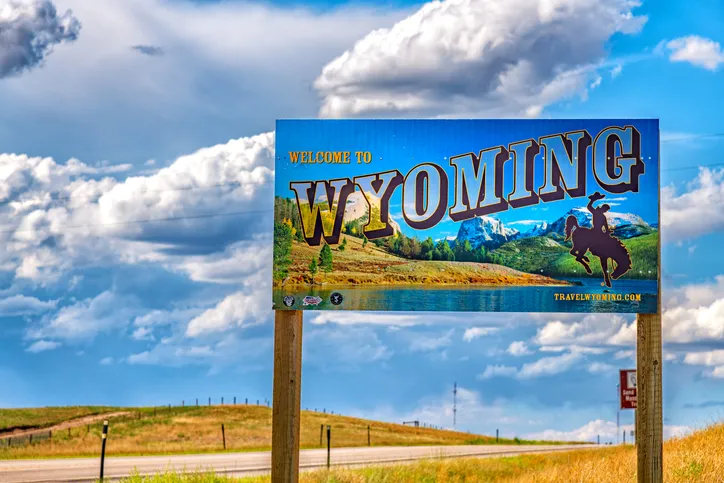If you want to meet Wyoming residency requirements for taxes you must have a primary and permanent home in the state. Factors such as property ownership, vehicle registration, voter registration and time spent in the state also contribute to determining residency status. Additionally, individuals may need to update their driver’s license and mailing address while severing ties with their previous state of residence. Establishing clear intent to reside in Wyoming can help avoid complications with tax authorities from other states that may still claim tax obligations. A financial advisor can help you learn more about state tax requirements and rates.
What Are the Wyoming Residency Requirements?
Wyoming has no personal income tax, making it an attractive option for those looking to establish residency. But, this also means that residency requirements for tax purposes primarily involve establishing domicile – the place considered a person’s permanent home. To be recognized as a legal resident for tax and other legal matters, an individual must demonstrate an intent to make Wyoming their primary residence and sever ties with their previous state.
While Wyoming law does not specify a minimum number of days required to establish residency, individuals who spend more than 183 days per year in another state may still be subject to that state’s tax laws.
People moving from states with high taxes could face scrutiny from tax authorities in their former state. So, it’s important to document your intent to move. Wyoming doesn’t ask for formal statements or affidavits to prove residency, but having consistent evidence that you live and work there helps establish your tax domicile. A tax consultant can also help explain what you need to do.
Wyoming Residency for Business Owners and Entrepreneurs
Entrepreneurs looking to avoid taxes from their previous state need to establish their personal home and make sure that their business mainly operates in Wyoming. This involves registering the business with the Wyoming Secretary of State, keeping a local office or physical presence through yourself or a registered agent, and potentially hiring local employees.
If you’re moving from a high-tax state, maintaining business connections there can challenge your new residency status. For example, if you run a Wyoming LLC but still handle operations, meet clients, or earn significant income in your old state, that state may still want to tax your earnings. To reduce this risk, move your operations to Wyoming, use a Wyoming-based registered agent, and make management decisions within the state to reinforce your residency claim.
Examples of Moving from High-Tax States to Wyoming

Here are two examples to show how a move from a high-paying state to Wyoming can impact your taxes.
First, let’s take a look at a business owner from New York. They relocate to Wyoming to avoid state income taxes. Then, they buy a home in Casper, update their driver’s license, register to vote, and open a Wyoming-based bank account. They also relocate their business headquarters to Wyoming, switch to a local doctor and spend most of the year there.
When New York income tax authorities review their case, they confirm no remaining ties to the Empire State, as the owner has no property, bank accounts, or business interests left there and spends less than 183 days in the state, solidifying their residency in Wyoming.
Now, for a second example, let’s take a look at a semi-retired consultant from California. They move to Wyoming but keep a second home in Los Angeles, where they spend their summers. They continue to use a California doctor and bank with a Los Angeles branch.
During an audit, California’s tax authorities discover that the consultant spent more than 183 days in the state and still maintains significant ties there. As a result, despite their Wyoming residency claim, California deems them a resident for tax purposes, requiring them to pay state income tax.
Pros and Cons of Moving to Wyoming for Tax Reasons
Wyoming’s absence of state income tax and favorable business policies attracts individuals seeking lower taxes. However, moving to Wyoming for tax reasons requires more than just a new address. Previous states may still claim taxes, and Wyoming’s cost of living and lifestyle might not be suitable for everyone.
Advantages
If you plan to move to Wyoming, here are four advantages to consider:
- No state income tax: Wyoming stands out by not taxing personal income, retirement income, or capital gains, providing significant savings for residents compared to states with higher tax rates.
- Business-friendly environment: Wyoming is particularly favorable for business owners due to the absence of corporate income taxes, franchise taxes, and gross receipts taxes. This welcoming tax structure can facilitate business growth and attract entrepreneurs.
- Low property taxes: Property owners in Wyoming benefit from one of the lowest property tax rates in the United States. This can lead to considerable savings on real estate investments and residential properties compared to other states.
- Privacy protections: Wyoming offers exceptional privacy protections, including strong asset protection laws. Importantly, it maintains confidentiality by not requiring public disclosure of LLC ownership, which can be crucial for business owners seeking anonymity and security.
Disadvantages
Before you move to Wyoming, consider these four tax disadvantages:
- Property taxes: Although Wyoming has no state income tax, its property taxes, while generally lower than the national average, might still be a concern for those moving from states with significantly lower property tax rates.
- Sales tax: Wyoming imposes a state sales tax, and localities can add additional sales taxes. Depending on the specific locality, the combined sales tax can be higher than in some states with lower state-level sales taxes.
- Limited tax benefits for renters: Unlike some states that offer income tax credits or deductions to renters, Wyoming’s lack of state income tax means there are no state tax benefits specifically for renters, which could be a disadvantage for non-homeowners.
- Estate tax considerations: While Wyoming does not have its own estate or inheritance tax, residents are still subject to federal estate taxes. For those with significant assets, the lack of state-level estate tax breaks or credits that might be available in other states could be a drawback.
Bottom Line

Moving to Wyoming can offer tax benefits, but you must clearly establish residency to avoid issues with tax authorities from other states. Business owners need to move their operations to Wyoming to escape tax duties from their previous states. While the lack of state income tax and a favorable business environment are attractive, consider other factors like the local climate, available amenities, and the possibility of residency audits before deciding.
Tips for Tax Planning
- A financial advisor can help you create a plan to minimize your tax liability. Finding a financial advisor doesn’t have to be hard. SmartAsset’s free tool matches you with vetted financial advisors who serve your area, and you can have a free introductory call with your advisor matches to decide which one you feel is right for you. If you’re ready to find an advisor who can help you achieve your financial goals, get started now.
- SmartAsset’s tax return calculator can help you estimate how much you could earn for your next refund or balance due.
Photo credit: ©iStock.com/Art Wager, ©iStock.com/ , ©iStock.com/Cecilie_Arcurs
